Malala Yousafzai Is 'Deeply Worried' About Women Amid Taliban Takeover

The advocate is calling for an ‘immediate ceasefire’
The horrifying news of the Taliban seizing control in Afghanistan made headlines over the weekend. Activist Malala Yousafzai joined the millions of concerned voices speaking out about her fear for women and children who now live again in their midst.
The Oxford graduate, who was shot in the head by a Taliban gunman in Pakistan when she was just 15, said she was in “complete shock” watching its forces take over the city of Kabul in just under a week as U.S. troops withdrew — a move years in the making. Afghan President Ashraf Ghani has also fled his nation.
“We watch in complete shock as Taliban takes control of Afghanistan,” she wrote on Twitter. “I am deeply worried about women, minorities and human rights advocates. Global, regional and local powers must call for an immediate ceasefire, provide urgent humanitarian aid and protect refugees and civilians.”
Yousafzai spoke out publicly about girls’ right to an education and was targeted by the Taliban and then shot on her school bus. She survived and became an advocate for women’s rights, going on to win the Nobel Peace Prize in 2014, the youngest ever to receive the honor.
Now, Yousafzai and many others fear their takeover will reverse decades of work to help women and minorities receive equal rights. During their earlier rule of the country, the Taliban imposed Sharia law, barring women from working outside the home, attending school, leaving their homes alone, working with men, and speaking out about anything that contradicts Taliban rule. Women were also required to wear the burqa and dress conservatively. If they were found guilty of adultery, they were stoned to death.
Today, Taliban leadership says it is open to girls being educated, but human rights groups say what actually happens on the ground will depend on who the local commanders are and what they believe in.
“The gap between official Taliban statements on rights and the restrictive positions adopted by Taliban officials on the ground indicates that the Taliban are far from an internal consensus on their own policies,” the New York-based Human Rights Watch said in a report last year.
As their rule became more inevitable over recent months, the UN reported in July that civilian deaths in Afghanistan have risen by almost 50% since the beginning of 2021. More women and children have been killed in the first six months of 2021 than in any other year since records began in 2009.
In her work, Yousafzai started the Malala Fund, a groups that, “supports the work of educators and advocates and helps bolster girls’ secondary education around the world.”